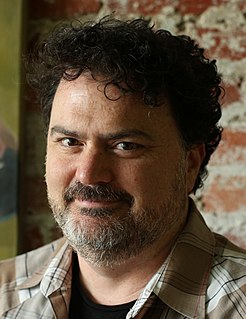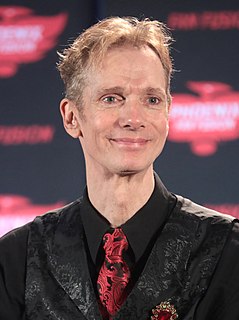A Quote by Cillian Murphy
I think if you play characters, it's very important not to ever tag them with any sort of disorder, or diagnose them, or whatever. You have to normalize the behavior to get inside the character.
Related Quotes
Sometimes, when actors reach out to their characters, they're nowhere in sight. They need to find something inside of them. And then the characters are right there. As a director, I want them to find the character that's already inside them, instead of trying to manufacture or manipulate or make something up. That's not really honest or true.
For me, the best characters are the ones that feel fully formed inside and out, so I try to have a very clear vision of exactly what they would wear, top to bottom, who they are, what their backstory is, what their family situation is, who are their friends, just creating as much of a three-dimensional character [as possible]. Because I think you could do a very broad character, but as long as there's some emotional truth to them you can get away with really crazy things.
I don't think I ever relinquish a person I have known, and surely not my fictional characters. I see them, I hear them, with a clarity that I would call hallucinatory if hallucination didn't mean something else ... A character whom we create can never die, any more than a friend can die ... Through [my characters] I've lived many parallel lives.
A radio play actually ended up being the first acting job I ever had. A lot of times when I'm on camera, I'm playing characters that are more like myself, and I don't get to do a lot of real character work. But when you're doing animation, you are the very epitome of colorful characters. I think I'm just really into make believe.
Sometimes I'll be fifty, sixty pages into something and I'll still be calling a character "X." I don't have a very clear idea of who the characters are until they start talking. Then I start to love them. By the time I finish the book, I love them so much that I want to stay with them. I don't want to leave them ever.
I think me, as a leader, as a guy that's been cut, been humiliated, embarrassed, whatever you put on it, I think it's important just to embrace the guys around you, really support them, encourage them and then kinda give them that confidence. Let them know that you believe in them, and hopefully they'll get to believing in themselves.
I worked with dance a lot, for each character - different ways I could move my body, different music. It's the most fun thing in the world, because I love each and every one of the characters and I'd be happy just to play one of them, but the fact that I get to play upwards of six, seven, eight or whatever, it's a total dream.
People are flawed. I like peaking into their flaws. The way to humanize them is not to play them in any general way, but to make them very specific. If you make them specific, they have hopes and dreams and loves and vulnerabilities and quirks and you get to know them and you get to appreciate them.
Even when you think you can detach yourself from the characters, you don't. Because you're spending so much time trying to realize this person and make them real that they do infect you, in a way. And you do take them home and live with them, even if you think you're turning the character off. But in order to pull off a role convincingly, you wind up thinking about that person all the time, and it does sort of creep into you. And then there are things that you'll respond to, or react to in a very different way than you would normally.




































